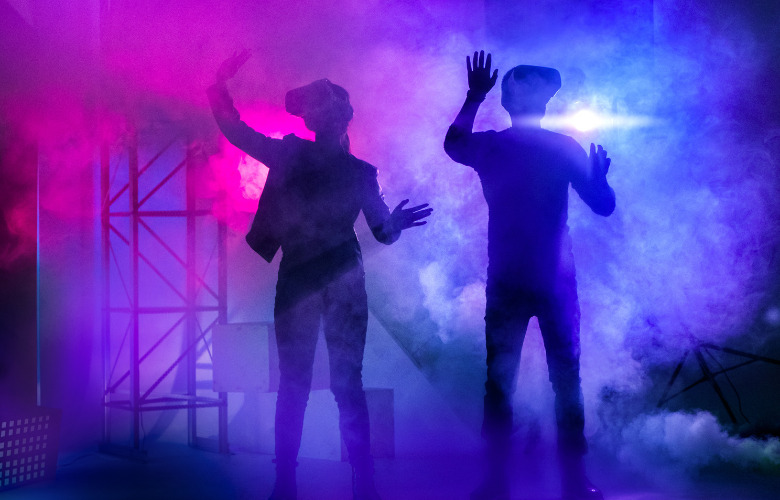
Last year at USITT, I attended four seminars about Artificial Intelligence, all about using A.I. image generators to inspire or generate contents for design projects. There was one conversation I found especially fascinating:
“Do you think A.I. will eventually replace designers?”
“No, but I think designers who use A.I. will eventually replace those who don’t.”
I think it’s a very wise answer, because as generative A.I. tools such as ChatGPT becoming more and more powerful, almost every industry is exploring the possibility of incorporating A.I. tools into their daily workflow to boost productivity. According to a study by Open AI and UPenn, generative A.I. will impact 10% of the tasks carried out daily by 80% of all workers. As managers in theatre industry, we are no exceptions: we should embrace a future in which A.I. tools assist us in carrying out our daily tasks more efficiently, so that we can invest more time and attention in more meaningful, human-centered works.
If you’re a stage manager familiar with Office software and other tools for paperwork, it’s very likely that you’ve already been using many A.I. functions: the auto-correction function of word-processing Apps, the Designer function of PowerPoint, the automatic sentence-complete function of Outlook, etc.
However, tools like ChatGPT that emerged in recent years can go far beyond that: they are artificial intelligence systems that can produce high-quality content, including text, codes, image, video, and audio. Besides simple functions mentioned before, they can now write a whole script, create a slide show, or create theatrical designs in a few seconds. They can understand natural language and its context, so that you can chat with them back-and-forth. What’s more, they can learn from newly provided materials, therefore you can train them into AI agents who can carry out specific tasks for you.
Using ChatGPT 4, I tested generative A.I.’s capability of doing some stage/production management-related works. Even though it also has powerful coding capability that can significantly improve many stage/production management-related software, my testing is focused solely on the potential of its everyday, accessible use for individual stage and production managers. The results show that it has many limitations when performing these tasks, and the outcomes are often far from satisfying, therefore it can’t replace human workers as of right now; however, considering the jaw-dropping speed of the development of A.I., there’s a promising perspective that it will become better and a powerful tool soon.
Generative A.I. tools are excellent at reading long and complex texts, then generating summary, critique, or certain answers within a few seconds. This can be very helpful when processing complicated documents.
As stage/production managers, we often keep track of multiple channels of communication to solve problems. Ever found yourself trapped in a long email chain/chat history and had to understand the situation? What’s worse, if there are multiple trains of communication about the same topic happening simultaneously, it makes it even more difficult to unravel.
Generative A.I. is good at this: you can simply copy and paste all the emails/chats/notes into ChatGPT, and ask it to “summarize the final decisions, questions, and action items”, then it will make a very precise and clear report, showing you all the important information.
No matter you’re an Equity stage manager, or a production manager who deals with various union contracts, you need to have a thorough understanding of rulebooks and contracts. Sometimes, the process of combing through these long documents and finding out answers to specific cases can be difficult and time-consuming. With GPT4, you can import the whole rulebook and interact with A.I. to find out answers.
What it does well:
What it doesn’t do well
Another complex reading task that stage/production managers are often faced with is scheduling. When you have a big company with several shows going on simultaneously, avoiding double-booking becomes tricky; even proofreading a schedule for such scenario can be difficult. There are some professional software that have conflict-checking function, but they are expensive and need complex training. What if you can import a full schedule into ChatGPT and let it do the proofreading for you?
In theory, this would be a simple task for A.I. since it’s a logical and cross-checking task. However, in my testing, ChatGPT performed poorly when processing a normal daily schedule. The reason is the same: it can’t read paperwork structured in a table, which is the most common format for schedules. Therefore, all other common paperwork such as Run Sheet, Props List, Costume Change Sheet are all unsolvable puzzles for generative A.I. as of right now.
Although stage/production manager must often read the script several times to retrieve necessary production information and gain artistic understanding, it doesn’t hurt to have A.I. retrieve information for cross-checking and efficiency. What’s more, sometimes production managers need to review multiple scripts in a short period of time, and A.I. can help find out essential information in those scenarios.
What it does well:
Similar to its strengths in interpreting rulebooks, ChatGPT can summarize the basic information of a script very efficiently, including plot, theme, character’s features and motivations, content warning, etc. If you need to understand the basic scale and demands of a production in a short time period, it can be a great tool.
What it doesn’t do well:
Stage managers are professionally required to write blocking notes that are clear enough, so that any trained people can understand them, for emergency or archival purposes.
ChatGPT has been proved an excellent tool for transcribing texts from images, even esoteric languages (it has even been used in archaeology to decipher ancient manuscripts). With some basic training, it can become a powerful tool for accurately transcribing scanned blocking pages into text format.
As stage/production managers, we routinely deal with paperwork and use various written communication tools. What if we take advantage of A.I.’s ability to generate high quality texts, to help make our writing better and more efficient?
There are already multiple Apps in the market that can transcribe everything people say during a meeting, and sort it into a meeting notes document. The transcript function of many online meeting apps is also powerful enough, that you can have a very detailed and accurate transcript immediately after the meeting. Using ChatGPT4, I imported a meeting transcript from Zoom, and asked it to generate a meeting minutes and sort notes by departments, and specifically asked it to list action items separately. The result is quite satisfying: ChatGPT can generate a well-written, comprehensive, and accurate meeting minute, tailored to the specificity that you asked.
We as human stage/production managers, on the other hand, are better at seeing the connections between pieces of information and sorting out the important ones. For example, based on our knowledge of technical theatre, when we learned the scene designer wants to change their color palette, we immediately know we need to inform Lighting, Media, etc.
With just ChatGPT, it’s unable to see these more sophisticated connections since it lacks training and knowledge in these specialized fields. However, with more advanced A.I. techniques, such as Fine-tuning and Pre-training, it’s very possible an A.I. model can learn to recognize these internal connections and write better notes. In fact, with enough training, I believe generative A.I. can become better than human, at recognizing these logical patterns, and it can even remind us when we neglect any cross-departmental references.
It seems counter-intuitive to ask for help from A.I. for something as simple as writing emails. But in fact, many email apps have already incorporated A.I. to suggest instant quick responses, based on the email you’re responding to.
When it comes to writing more complicated content, ChatGPT is also an excellent assistant as a proofreader, a reasoning engine, and a thinking partner. Here’re some good examples:
What’s more, if you worry that it might not sound like yourself after modifying the style – no worries, ChatGPT can even learn your writing style! You just need to import some of your writing samples, then ChatGPT will simulate your style and generate contents based on that style.
As stage/production managers, we’re the hub of information in a production team, and often the go-to person when people have all sorts of questions. We answer those questions by using our comprehensive understanding of technical theatre and our institutional knowledge of the people, the show, and the theatre; if we can’t answer those questions, we point people to the correct personnel in charge of those fields.
What if we train an A.I. chatbot to answer the questions as well as we do? People usually hate dealing with customer service chatbots, because they’re inflexible, unable to understand full context, and react to new situations slowly. But if it has all the institutional and technical information, and can answer questions fast and flexibly, just imagine how much time and work it can save you from.
With the new Customizable GPTs function of ChatGPT 4, you can easily build a knowledge base for your organization. You just need to import all your company rulebooks, guidelines, etc. into your Own GPT, customize its conversation style, then it becomes an intelligent agent that can answer questions like a human. The more knowledge you feed it, the more powerful it becomes. In a complex, huge organization, this is a strength that human workers need years of experience and learning to obtain.
Per tests mentioned before, ChatGPT 4 has many limitations when performing certain tasks and is not reliable enough to function independently. There are still technical shortcomings (mainly the inability to understand tables) making it incompatible with many paperwork that stage/production managers are familiar with. However, there’re also several aspects in which ChatGPT can function well and shows promising capabilities.
As a stage manager, I have no doubt that there are so many human aspects of our profession that can never be replaced by A.I. But just as computer and Google changed our life and work drastically in the last few decades, I also have no doubt that generative A.I. will revolutionize how we work soon. There’s a more artificially intelligent world in front of us, and we must face it one way or another: if we ignore or evade it, it will become a challenging enemy who may replace us; but if we learn, embrace, make great use of it, it will become a powerful tool, and make our work and life much better.
This article was written by our Guest Contributor, Tom Zhang.
Tom Zhang is an emerging stage manager from Beijing, China, and currently a Lecturer in Stage Management at the University of Miami Department of Theatre Arts. His favorite stage management credits include: Fiddler on the Roof (Seagle Festival), Something Rotten (Post Playhouse), Sound of Music (Post Playhouse), and Turn of the Screw (Lyric Theatre at Illinois). His Assistant Stage Management credits include: Urinetown (Illinois Theatre), and The Adventures of Little Sharp-Ears (Lyric Theatre at Illinois). His current interest of research is the use of database and generative A.I. in stage management practices. He got his MFA in Stage Management from the University of Illinois Urbana-Champaign.


Guest Posts are written by featured authors who are not frequent contributors to TheatreArtLife. Details of the contributor can be found within each article unless the author wishes to remain anonymous. If you would like to submit a guest article to TheatreArtLife, please visit TheatreArtLife.com/Contribute or select CONTRIBUTE in the menu.
Read Full Profile© 2021 TheatreArtLife. All rights reserved.

Thank you so much for reading, but you have now reached your free article limit for this month.
Our contributors are currently writing more articles for you to enjoy.
To keep reading, all you have to do is become a subscriber and then you can read unlimited articles anytime.
Your investment will help us continue to ignite connections across the globe in live entertainment and build this community for industry professionals.